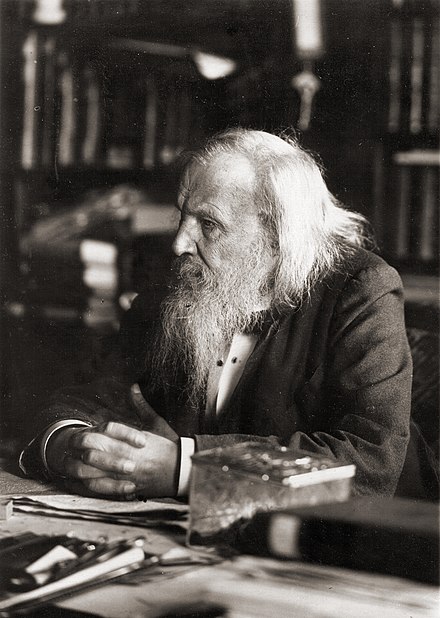Periodic table
Dmitri Mendeleev is often referred to as the Father of the Periodic Table.
Mendeleev published his periodic table of all known elements and predicted several new elements to complete the table in a Russian-language journal. Only a few months after, Meyer published a virtually identical table in a German-language journal.[38][39]
Mendeleev was a friend and colleague of the Sanskritist Otto von Böhtlingk, who was preparing the second edition of his book on Pāṇini[44] at about this time, and Mendeleev wished to honor Pāṇini with his nomenclature.[45][46][47]
Mendeleev may have recorded his debt to the Sanskrit grammarians of ancient India, who had created sophisticated theories of language based on their discovery of the two-dimensional patterns of speech sounds (arguably most strikingly exemplified by the Śivasūtras in Pāṇini's Sanskrit grammar).
The Russian chemist and science historian Lev Chugaev characterized him as "a chemist of genius, first-class physicist, a fruitful researcher in the fields of hydrodynamics, meteorology, geology, certain branches of chemical technology (explosives, petroleum, and fuels, for example) and other disciplines adjacent to chemistry and physics, a thorough expert of chemical industry and industry in general, and an original thinker in the field of economy." Mendeleev was one of the founders, in 1869, of the Russian Chemical Society. He worked on the theory and practice of protectionist trade and on agriculture.
In another department of physical chemistry, he investigated the expansion of liquids with heat, and devised a formula similar to Gay-Lussac's law of the uniformity of the expansion of gases, while in 1861 he anticipated Thomas Andrews' conception of the critical temperature of gases by defining the absolute boiling-point of a substance as the temperature at which cohesion and heat of vaporization become equal to zero and the liquid changes to vapor, irrespective of the pressure and volume.[52]
Mendeleev is given credit for the introduction of the metric system to the Russian Empire.
He invented pyrocollodion, a kind of smokeless powder based on nitrocellulose. This work had been commissioned by the Russian Navy, which however did not adopt its use. In 1892 Mendeleev organized its manufacture.
Mendeleev studied petroleum origin and concluded hydrocarbons are abiogenic and form deep within the earth – see Abiogenic petroleum origin.
He wrote: "The capital fact to note is that petroleum was born in the depths of the earth, and it is only there that we must seek its origin." (Dmitri Mendeleev, 1877)[57]
Beginning in the 1870s, he published widely beyond chemistry, looking at aspects of Russian industry, and technical issues in agricultural productivity. He explored demographic issues, sponsored studies of the Arctic Sea, tried to measure the value of chemical fertilizers, and promoted the a merchant navy.[58] He was especially active in promoting the Russian petroleum industry, making careful detail comparisons with the more advanced industry in Pennsylvania.[59] He joined in the debate about the scientific claims of spiritualism, arguing that metaphysical idealism was no more than ignorant superstition. He bemoaned the widespread acceptance of spiritualism in Russian culture, and its negative effects on the study of science.[60] Although he was not well grounded in economic theory, he helped convince the Ministry of Finance in 1887-1891 to impose a temporary tariff in 1891 which, based on his wide travels in Europe, suggested it would allow Russian industry to mature faster.[61] After resigning his professorship at St. Petersburg University following a dispute with officials at the Ministry of Education in 1907, he became director of Russia's Central Bureau of Weights and Measures, he led the way to standardize fundamental prototypes and measurement procedures. He set up an inspection system, and introduced the metric system to Russia.[62][63]
| Part of a series on the |
| Periodic table |
|---|
After becoming a teacher in 1867, Mendeleev wrote the definitive textbook of his time: Principles of Chemistry (two volumes, 1868–1870). It was written as he was preparing a textbook for his course.[25] This is when he made his most important discovery.[25] As he attempted to classify the elements according to their chemical properties, he noticed patterns that led him to postulate his periodic table; he claimed to have envisioned the complete arrangement of the elements in a dream:[27][28][29][30][31]
I saw in a dream a table where all elements fell into place as required. Awakening, I immediately wrote it down on a piece of paper, only in one place did a correction later seem necessary.
https://en.wikipedia.org/wiki/Dmitri_Mendeleev
Dmitri Ivanovich Mendeleev (often romanized as Mendeleyev or Mendeleef) (English: /ˌmɛndəlˈeɪəf/ MEN-dəl-AY-əf;[2] Russian: Дмитрий Иванович Менделеев,[note 1] tr. Dmitriy Ivanovich Mendeleyev, IPA: [ˈdmʲitrʲɪj ɪˈvanəvʲɪtɕ mʲɪnʲdʲɪˈlʲejɪf] (

Mendeleev in 1897
| |
| Born |
Dmitri Ivanovich Mendeleev
8 February 1834
Verkhnie Aremzyani, Tobolsk Governorate, Russian Empire
|
|---|---|
| Died | 2 February 1907 (aged 72)
Saint Petersburg, Russian Empire
|
| Nationality | Russian |
| Alma mater | Saint Petersburg University |
| Known for | Formulating the periodic table of chemical elements |
| Spouse(s) |
|
| Awards |
|
| Scientific career | |
| Fields | Chemistry, physics |
| Academic advisors | Gustav Kirchhoff |
| Notable students |
|
| Signature | |
 | |





